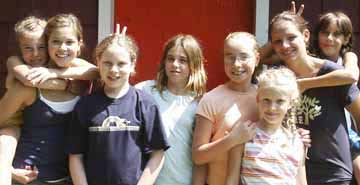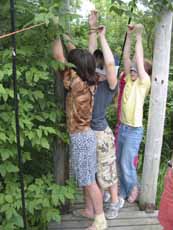Canadian Mennonite
Volume 11, No. 03
February 5, 2007

Reflection on the significance of summer camp
Hidden Acres, New Hamburg
 |
When someone asks me about profound experiences I have had in my life, I don’t have to think about it very long. The answer is not far from my mind or my heart. It is camp.
Some of my first encounters with God were at camp. Several of my longest-lasting friendships began at camp. Many of my most challenging moments were at camp. I’ve had great moments of personal achievement at camp. My understanding of worship deepened at camp. I found important mentors at camp.
Our experiences form us. We learn to understand God’s story from those who have gone before us and those who are walking with us right now. The people with whom we share our weakest moments help to shape us. We find our place in the world by testing our abilities, and by receiving encouragement and direction from those with whom we work and play. We know our worth by allowing ourselves first to be loved and then to love. We know faith when we embrace the wonder of what God is doing.
These are the real experiences I’ve had through my years as a camper and staff member at camp. These are the things that have given me roots, established my confidence in Jesus, and continue to form me.
“So then, just as you received Christ Jesus as Lord, continue to live in him, rooted and built up in him, strengthened in the faith as you were taught, and overflowing with thankfulness” (Colossians 2:6-7).
How can camps fulfil call to justice?
Laurelville
 |
Ronald J. Sider, president of Evangelicals for Social Action, a theology professor and author of Rich Christians in a Hungry World and other works, presented a challenge last year at Laurelville Mennonite Church Center’s spring association meeting—a challenge relevant for all Mennonite Camping Association (MCA) camps.
In speaking about the Bible’s instructions on caring for creation, Sider posed these questions:
• Have Mennonites lost their commitment to simple living?
• Given the needs to combat global hunger and care for God’s creation, what does a faithful lifestyle look like today?
• Can Mennonites—like the first Christians who lived like Jesus—change the world today?
“Christians must become vigorous environmentalists because it is biblical,” Sider explained, and to practise creation care the church must hold together God’s transcendence of creation and God’s immanence in creation.
“Dominion must be gentle care; we have made it a domination,” Sider said.
“Genuine Christians embrace both God’s searing holiness and God’s astonishing love, know who Jesus really is, keep their marriage vows and place family above success, share God’s concern for the poor and love the whole person, and embrace servanthood,” he said.
Sider observed that Mennonite retreat centres have improved their facilities and have become more expensive over the years. He asked, “How much are we pandering to the growing materialism in our churches? How do we make sure our facilities also serve the poor?”
Camps help kids overcome ‘nature-deficit disorder’
Last Child in the Woods: Saving our Children from Nature-deficit Disorder. Richard Louv. Algonquin Books, 2005.
The last thing our culture needs is another disease to worry about, but “nature-deficit disorder” is relatively easy to cure. Louv’s insightful and startling book argues that nature has been marginalized in our society, to our detriment. He also provides ways in which that trend can be reversed.
Today’s children prefer to spend time indoors, where the electrical outlets are, because the outdoors has been portrayed by adults as scary. Rules and liability concerns restrict traditional children’s activities, such as building tree houses or playing in the forest. Unfounded parental fears, often media-driven, are transferred to children.
The cost is nature-deficit disorder, the symptoms of which include diminished use of the senses, attention difficulties and higher rates of illness. Louv cedes that this is not a clinically established term, but piles on the evidence that it is nevertheless of great concern. Exposure to nature may improve cognitive performance, emotional health, physical health and creativity.
Bringing nature into the lives of children takes intentional work. More people need to study the classic natural sciences, which teach identification and understanding of flora and fauna. Children need to be encouraged to have a special natural place, be it as simple as a ditch or a corner of the backyard. Educators need to recognize, as has multiple intelligence theorist Howard Gardner, the existence of the “naturalist intelligence,” which consists of the ability to identify, distinguish and differentiate natural objects.
At a spiritual level, we need to continue our contact with nature, lest we forget our place in the world. The ringing oratory of Job 38 to 41 comes to mind. Nature connects us to God and to humanity. Children often report transcendent experiences in nature. The nature experience needs to be shared with adults, who can help children rediscover the joy, excitement and mystery of the world we live in.
Louv paints a picture of a new natural order. Passion based on personal contact with nature fuels the struggle to save our natural heritage. Classrooms head outdoors, using the natural environment as a means of engaging students in learning. “Zoopolis” is created, consisting of a city transformed into a natural habitat. A new back-to-the-land movement constructs new green communities.
Louv states that camps have a key role to play in exposing children to nature. My personal experience is that camp nature programs succeed only when one intentionally finds and equips young adult camp staff with passion and the tools for learning and teaching about nature.
Can we imagine our Mennonite camps as “nature preserves” in the sense that they lead in restoring us to a proper relationship with nature, fuel our passion for conservation, and provide venues for reflecting on the lifestyle changes that will make us better stewards of creation and of humanity?